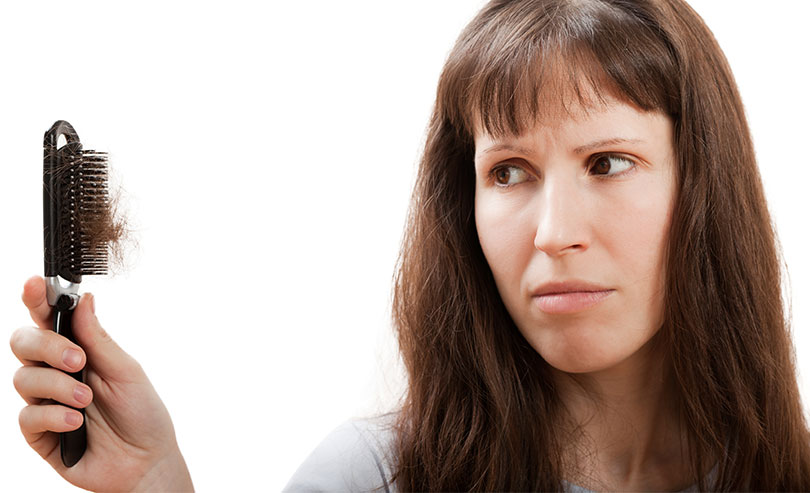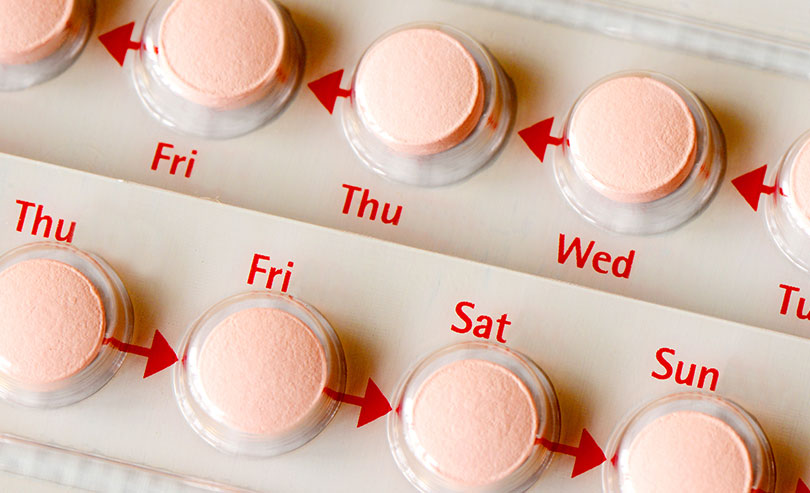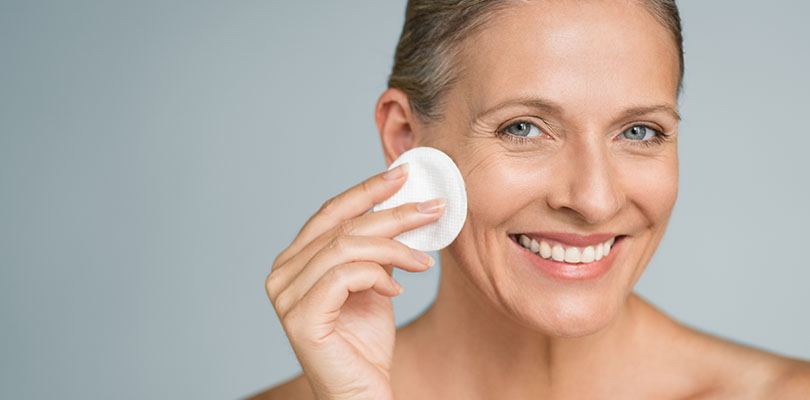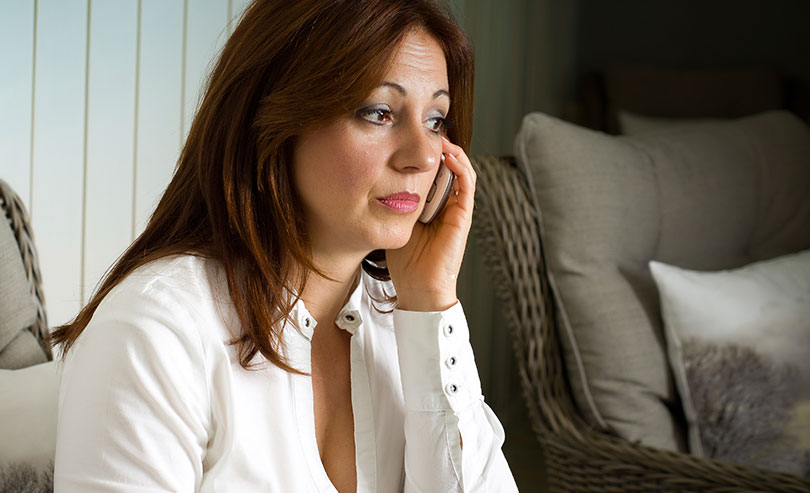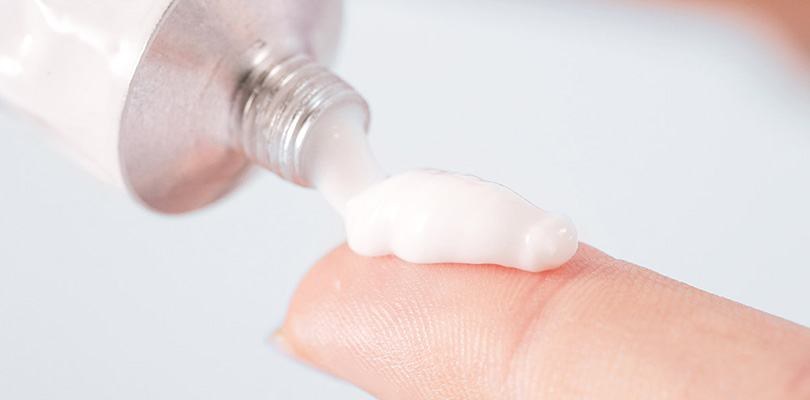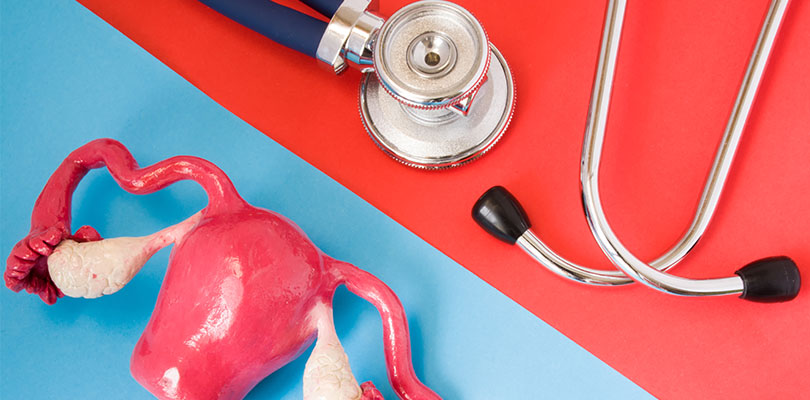Photo Credit: ia_64 / istockphoto.com
Menopause and Hair Loss
Menopause is a time of change, there’s no doubt about that. Your natural processes are shifting at a glandular level, and that will probably result in some changes on the surface, too. While hot flashes and mood swings are uncomfortable, they are to be expected; other changes seem to pop up out of blue, and wreak havoc on your self-image. For many women, hair loss tops that list.
It may surprise you to learn that nearly as many middle-aged women as middle-aged men experience hair loss and thinning hair, though it tends to fall out gradually from all over the scalp, which means the problem can be more difficult to spot in the earlier stages. If your hair brush is hoarding more hair than usual, learn what may be happening and what you can do about it.
When Hair Loss is a Concern
Hair Loss is a natural process, for both women and men. In fact, it’s absolutely normal to lose between 50 and 100 hairs off your head each and every day; once these hairs have shed, the follicles immediately begin to regenerate new strands.
On the other hand, sudden or severe hair loss can point to a deeper problem. It can be tricky to determine how much hair loss is too much, but there are a few signs that may call for further investigation:
- Clumps of hair falling out in the shower
- Bald patches begin to appear
- Red, itchy, oily scalp
- Thinning hair at the front or sides of the scalp
In some cases, hair loss is genetic, and typically begins between early adulthood and middle age. In other cases, chronic anxiety, vitamin deficiencies, or underlying illness is to blame. If you’re going through menopause, a specific set of disruptive changes is probably at play.
Causes of Hair Loss in Menopause
Menopause hair loss can be upsetting, but if you notice that your hair isn’t as thick as it used to be, you are not alone. In fact, almost half of all women will lose a noticeable amount of their hair by age 50, although unlike their male counterparts, they rarely experience balding.
Of course, not going completely bald is cold comfort when you’re shedding an alarming amount of hair. However, understanding the forces at work may bring you some relief – especially if you can find a way to control them.
Hormone Fluctuations
Like so many menopause symptoms, hair loss is directly tied to changing hormones, and that’s a difficult process to avoid. As you move through menopause, your levels of estrogen and progesterone drop while your testosterone may rise, and experts tie this change to failing follicles, scalp hair loss, and the growth of facial hair. Therefore, it’s not uncommon to spot some stray chin hairs around the same time as you notice a thinning scalp.
Other hormones could be impacting your hair growth and loss, too. Sudden and severe hair loss could point to high levels of androgen, a male sex hormone, which some women are more genetically-prone to experiencing. The problem may also be traced to a malfunctioning thyroid or pituitary gland. In any case, sudden hair loss warrants a visit to your doctor for some blood tests to figure out which hormones may be out of balance, and to rule out more serious conditions.
Menopause weight gain is typically caused by slowing of the metabolism, genetic factors, drops in estrogen levels, and other aging factors.
Stress
Mood swings, anxiety, and depression put a lot of strain on both the mind and body. Unfortunately, they’re also pretty common problems during menopause, and without diligent treatment, they can even eclipse the physical symptoms. Experts aren’t exactly clear on how stress motivates hair loss (it may have something to do with an interruption to your natural hair growth and rest cycle), but it does seem to worsen any hair loss you may be experiencing in the first place.
To add to the dilemma, hair loss will cause more stress, and the continuing cycle can speed up the shedding and lead to considerable emotional strain. It can be a difficult cycle to break, but well worth your time to locate the cause of your stress, and take immediate steps to overcome it.
Treating Your Hair Loss during Menopause
Although losing your hair isn’t a happy experience, it doesn’t have to be inevitable. Typically, a varied treatment approach will work best: lifestyle changes, nutritional adjustments, and pharmaceuticals can combine to stop your hair loss, and hopefully prevent it from starting up again in the future. Begin with the least invasive and most natural treatments, working up to stronger interventions if the first changes aren’t helping.
Overhaul Your Diet
Hormones and stress are the most common culprits, but poor nutrition can compound the problem. Iron deficiency, lack of protein, too much vitamin A, and not enough vitamin B can all encourage hair loss, so it’s important to figure out where your diet may be lacking, and then make up for the imbalance.
A menu that focuses on whole foods in a rainbow of colors is the best way to get all the vitamins that you – and your hair – need. In some cases, a supplement can be useful, especially if your problem is low iron or protein, and you don’t eat much meat.
Relax
If stress is a factor, turn your attention to your emotional health. Stress is sneaky; little things can add up slowly until you’re carrying the weight of the world, and buckling under the pressure. Take a step back and evaluate your stress level, keeping a record in a journal for a few weeks to see how that level changes. You may uncover a major stressor that you hadn’t recognized before.
It may seem obvious, but be sure to take a break from the hustle and bustle of your daily life. Menopause is a time of upheaval for many women, and it’s important to allow yourself to feel what you need to feel. Find an outlet for your emotions, and work it into your weekly routine.
Seek Medical Treatment
If out-of-control hormones are at the root of your problem, medical intervention may be the only way to get your hair loss under control. Talk to your doctor about which medications may be suitable for your situation. Some options may include minoxidil solution, platelet-rich plasma injections, and laser therapy. You’ll need to go over your full medical history before landing on an appropriate treatment, and your doctor may choose to combine more than one approach for a more promising effect.
Be Patient
Hair loss doesn’t happen overnight, and treatment won’t work that way either. It’s important to give it some time before switching to another approach. When hair does begin to grow back, you may not be able to see it in the mirror or feel it in your hands for a while — give it at least a couple of months before you give up on the therapy.
Losing your hair may not hurt, but the emotional pain can run deep. Studies agree that hair loss is more than a cosmetic problem — it can lead to everything from social withdrawal to poor job performance, and those will certainly impact your quality of life. In turn, you owe it to yourself to restore your confidence, self-esteem, and happiness with healthy hair treatment and a healthy perspective. After all, your self-image matters, but you are much, much more than a head of hair.
Read more about how menopause can impact your self-esteem over at NewLifeOutlook.
